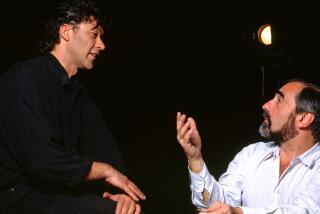Blame the Crusades
From swords to suicide bombers, the West’s relationship with the Middle East hasn’t changed much in the past millennium. That’s why the film “Kingdom of Heaven” struck a chord. It’s laden with silly inaccuracies to heighten the drama -- unnecessary, considering how much more eye-popping the bare truth is -- but it rams home the notion that events during the Crusades eerily parallel current world affairs.
There are the refined Western doves and the boorish Christian hawks trying to maneuver in a not-very-peaceful truce with the Islamic kingdom they’ve successfully invaded. The movie doesn’t touch on another similarity. The First Crusade began because Muslim Turks invaded Byzantine Christian territory centered in Constantinople. Rather than simply defend those lands, though, the Crusaders opted to add on something entirely unrelated: Jerusalem. The U.S. invasion of Iraq following the 9/11 attacks follows a similar illogic. Military victory then and now proved quick and simple compared with the aftermath.
The movie depicts the one Crusader era in which it is possible to avoid offending any one group. The bad Christians are just bad individuals, like bombastic Reynauld de Chatillon, accurately played as a greedy, bloodthirsty raider who intentionally rattled the peace. There are the good Christians, such as Balian of Ibelin, who defended Jerusalem and struck more than one praiseworthy deal with Saladin. All the Muslims in the movie are wise and honorable, which passes over a couple of less complimentary moments of actual history. But real-life Saladin did spare the lives of Christians after capturing Jerusalem, following a drastic threat by Balian to destroy the city. The Muslim victor set many of his hostages free without ransom and reopened the city to Jews.
The movie ends by noting that in modern times there is again conflict in the Middle East. That misses the point. The Crusades aren’t just a true-life allegory of current world conflicts. In various ways, they’re a major part of the reason those conflicts exist.
The Crusades were intended to bring the Western and Eastern churches closer by rescuing Byzantine Christians. Instead, after Crusaders pillaged Byzantine cities, a deeper wedge was driven between them. The Crusades created a mind-set in which Muslim presence would not be tolerated in Europe, which played out violently when Spain expelled its Muslims in 1492. Popes had long exhorted European Christians to sever all relations with Muslims, a call that echoes to this day. Newly elected Pope Benedict XVI opposes allowing Turkey into the European Union, saying it runs counter to history; he also deplores European multiculturalism as “fleeing from what is one’s own.”
Crusaders often wondered why, if they were fighting Muslims in far-off lands, they should leave unmolested other “infidels” closer to home -- Jews. Thus the Crusades gave rise to the first big waves of violent anti-Semitism in Europe, which would flare for centuries and eventually feed the Nazi Holocaust. This in turn gave birth to modern Zionism, seen by Muslims as another European imperialistic attack.
In effect, “Kingdom of Heaven” asks the insipid if sincere question, “Can’t we all just get along?” The more pertinent question is: How do we change the ending of a story whose plot was cast nearly 1,000 years ago?
More to Read
Only good movies
Get the Indie Focus newsletter, Mark Olsen's weekly guide to the world of cinema.
You may occasionally receive promotional content from the Los Angeles Times.






